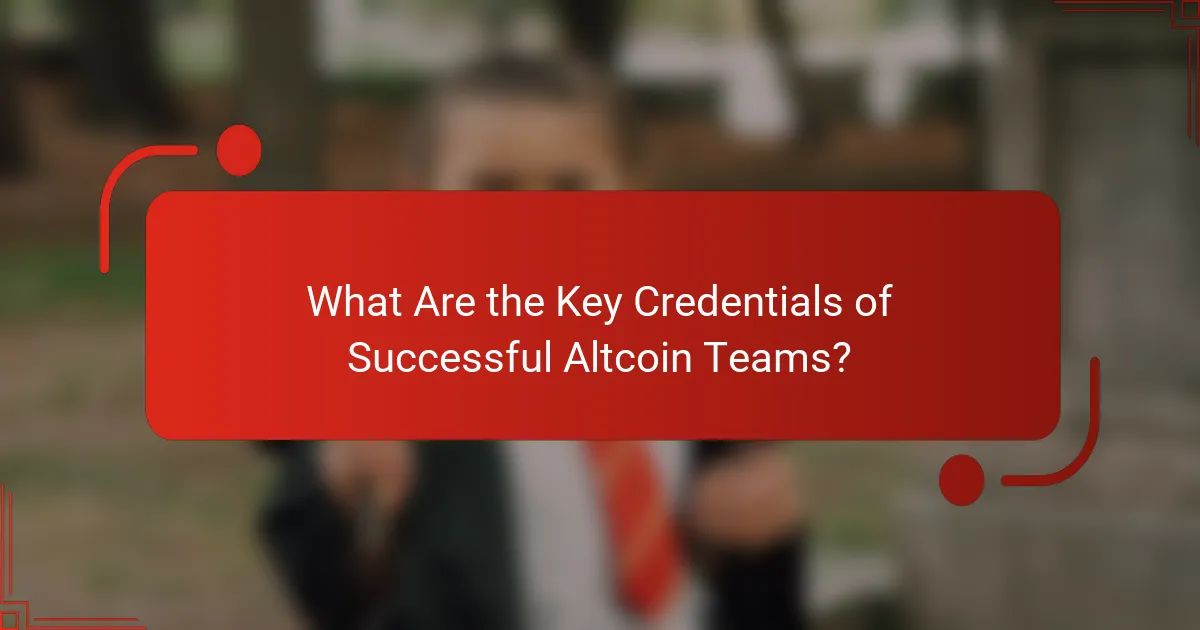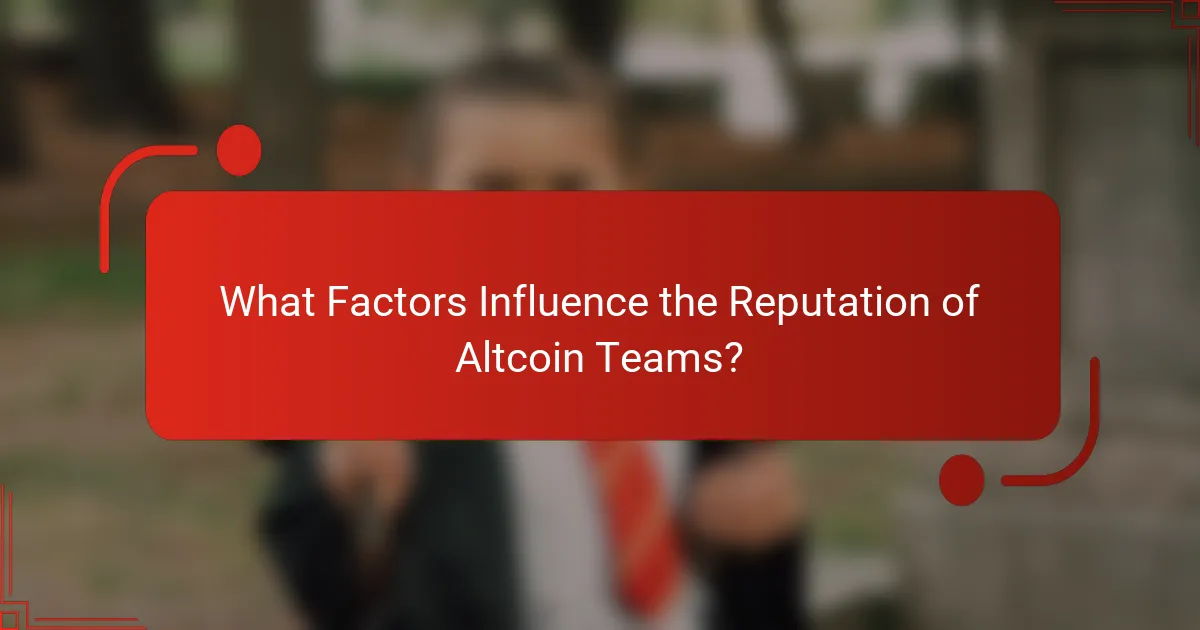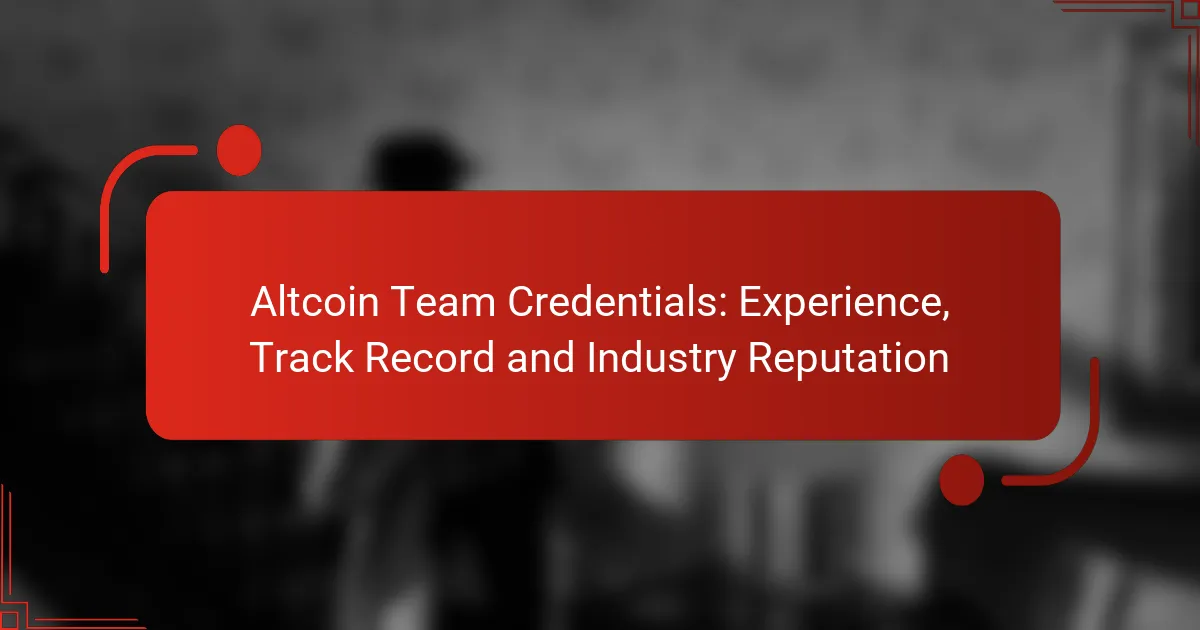In the competitive world of cryptocurrency, successful altcoin teams are distinguished by their industry experience, proven track records, and strong community engagement. Their credentials, including project milestones and performance metrics, play a crucial role in establishing credibility and fostering investor confidence. Additionally, factors such as transparency and regulatory compliance significantly influence their reputation within the industry.

What Are the Key Credentials of Successful Altcoin Teams?
Successful altcoin teams typically possess a combination of industry experience, a proven track record of previous projects, technical expertise, strong community engagement, and valuable partnerships. These credentials help establish credibility and increase the likelihood of a project’s success in the competitive cryptocurrency landscape.
Industry experience
Industry experience is crucial for altcoin teams as it provides insight into market dynamics and regulatory environments. Teams with several years in the blockchain or technology sectors are often better equipped to navigate challenges and seize opportunities. Look for teams that have worked in relevant roles within established companies or have launched successful projects.
Consider the backgrounds of team members, including their previous positions, the companies they worked for, and their contributions to the industry. A diverse team with experience in finance, technology, and marketing can bring a well-rounded perspective to the project.
Previous project success
A strong track record of previous project success can indicate a team’s ability to deliver results. Successful altcoin teams often have launched or contributed to other cryptocurrencies or blockchain initiatives that gained traction and user adoption. Review their past projects for metrics such as user growth, market capitalization, and overall impact on the industry.
When evaluating previous projects, consider the longevity and sustainability of those initiatives. Projects that have maintained relevance over time or adapted to changing market conditions demonstrate resilience and strategic thinking.
Technical expertise
Technical expertise is essential for developing a robust and secure altcoin. Teams should include members with strong backgrounds in software development, cryptography, and blockchain technology. Look for qualifications such as degrees in computer science or engineering, as well as experience with programming languages commonly used in blockchain development.
Additionally, assess the team’s ability to innovate and solve technical challenges. Projects that incorporate unique features or improvements over existing technologies often stand out in the crowded altcoin market.
Community engagement
Active community engagement is a key indicator of an altcoin team’s commitment to its users. Successful teams often maintain open lines of communication through social media, forums, and community events. This engagement fosters trust and loyalty among users, which can lead to increased adoption and support for the project.
Evaluate how the team interacts with its community, including responsiveness to feedback and transparency in decision-making. Projects that prioritize community input and adapt based on user needs tend to perform better in the long run.
Partnerships and collaborations
Strategic partnerships and collaborations can significantly enhance an altcoin’s credibility and reach. Teams that align with established companies, organizations, or other blockchain projects can leverage shared resources and expertise. Look for partnerships that provide technological, financial, or marketing support to the project.
Consider the nature and impact of these partnerships. Collaborations with reputable firms or industry leaders can signal confidence in the project and attract additional investment and user interest.

How Do Altcoin Teams Establish Their Track Record?
Altcoin teams establish their track record through a combination of project milestones, performance metrics, market adoption rates, and investor feedback. These elements provide insights into the team’s experience, reliability, and overall reputation within the cryptocurrency industry.
Project milestones
Project milestones are critical indicators of an altcoin team’s progress and commitment. These milestones typically include key phases such as initial coin offerings (ICOs), product launches, and major updates. Tracking these milestones helps investors gauge the team’s ability to meet deadlines and deliver on promises.
For example, a successful launch of a decentralized application (dApp) or the completion of a significant partnership can enhance a team’s credibility. Regular updates on milestones can also reflect transparency and engagement with the community.
Performance metrics
Performance metrics provide quantitative data on an altcoin’s success and the team’s effectiveness. Important metrics include transaction speed, network uptime, and scalability. These figures help assess how well the altcoin performs compared to competitors.
Investors should look for metrics that show consistent improvement over time, such as reduced transaction fees or increased transaction volumes. A strong performance record can indicate a capable team that is responsive to market needs.
Market adoption rates
Market adoption rates measure how widely an altcoin is used and accepted within the cryptocurrency ecosystem. This can be reflected in the number of active users, partnerships with merchants, and integration into existing financial systems. High adoption rates suggest that the altcoin has gained trust and utility.
For instance, if an altcoin is accepted by a growing number of online retailers or has a significant user base, it demonstrates market validation. Investors should consider these rates as a sign of the altcoin’s potential longevity and relevance.
Investor feedback
Investor feedback is crucial for understanding the altcoin team’s reputation and the community’s perception. This feedback can be gathered from forums, social media, and direct communication channels. Positive reviews and testimonials can indicate a strong relationship between the team and its investors.
Potential investors should pay attention to both qualitative and quantitative feedback. High levels of engagement and satisfaction among existing investors can signal a trustworthy team, while negative feedback may raise red flags about the team’s capabilities or project viability.

What Factors Influence the Reputation of Altcoin Teams?
The reputation of altcoin teams is influenced by several key factors, including their transparency, regulatory compliance, community support, and media coverage. These elements collectively shape how investors and users perceive the credibility and reliability of a project.
Transparency and communication
Transparency is crucial for building trust in altcoin teams. Teams that openly share their project goals, development progress, and financial information tend to gain more credibility. Regular updates through blogs, social media, and community forums can enhance a team’s reputation.
Effective communication also involves addressing community concerns promptly. Teams that engage with their audience and respond to feedback demonstrate accountability, which can significantly improve their standing in the market.
Regulatory compliance
Regulatory compliance is vital for altcoin teams, especially in regions with strict cryptocurrency regulations. Teams that adhere to local laws and guidelines, such as anti-money laundering (AML) and know your customer (KYC) requirements, are often viewed more favorably.
Being compliant not only helps avoid legal issues but also reassures investors that the project is legitimate. Teams should regularly update their compliance status to maintain transparency and trust.
Community trust and support
Community trust is a cornerstone of an altcoin’s reputation. A strong, engaged community can provide valuable support and advocacy for a project. Teams should foster this trust by actively participating in discussions and addressing community needs.
Building a loyal user base often involves incentivizing participation through rewards or governance roles. Projects that prioritize community involvement tend to enjoy better reputations and long-term success.
Media coverage
Media coverage can significantly impact the reputation of altcoin teams. Positive articles and features in reputable publications can enhance visibility and attract new investors. Teams should strive to cultivate relationships with journalists and influencers in the cryptocurrency space.
However, teams must also be cautious about negative press. Addressing any controversies or criticisms transparently can help mitigate damage and maintain a positive image. Regularly monitoring media sentiment is essential for reputation management.

How Can Investors Evaluate Altcoin Team Credentials?
Investors can evaluate altcoin team credentials by examining their experience, track record, and reputation within the industry. This involves researching team backgrounds, analyzing project whitepapers, and reviewing community forums to gain insights into the team’s capabilities and credibility.
Researching team backgrounds
Start by looking at the professional histories of the team members. Check their LinkedIn profiles and previous projects to assess their experience in blockchain technology and relevant industries. A strong team often has members with backgrounds in software development, finance, or entrepreneurship.
Consider the team’s previous successes and failures. A history of launching successful projects can indicate a higher likelihood of future success. Look for any notable achievements or contributions to the crypto space, such as participation in well-regarded projects or collaborations with established companies.
Analyzing project whitepapers
The project whitepaper is a critical document that outlines the altcoin’s purpose, technology, and roadmap. A well-crafted whitepaper should clearly explain the problem the project aims to solve and how the team plans to achieve its goals. Pay attention to the technical details and feasibility of the proposed solutions.
Evaluate the clarity and transparency of the whitepaper. If it lacks detail or is overly vague, it may be a red flag. Look for sections that discuss the team’s qualifications, funding allocation, and timelines, as these can provide insights into the team’s planning and commitment.
Reviewing community forums
Community forums, such as Reddit or specialized crypto discussion boards, can offer valuable insights into the team’s reputation. Engaging with community members can reveal their sentiments about the team and project. Look for discussions about the team’s responsiveness and willingness to engage with investors.
Monitor the frequency and quality of updates provided by the team in these forums. Active communication can indicate a dedicated team, while silence or evasiveness may suggest issues. Be cautious of overly positive or negative sentiments, as they can sometimes be influenced by bias or misinformation.
